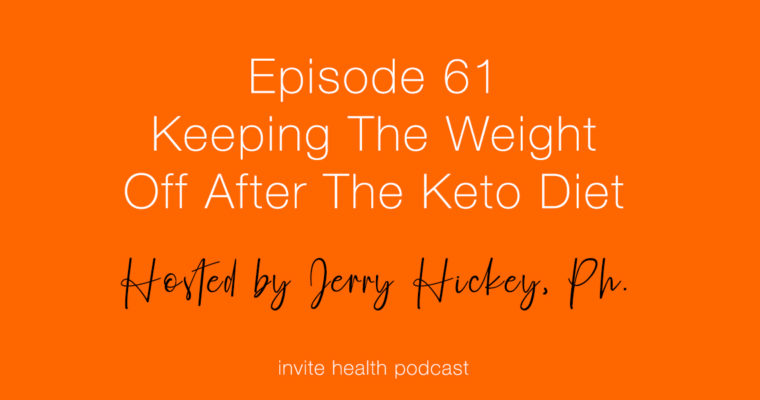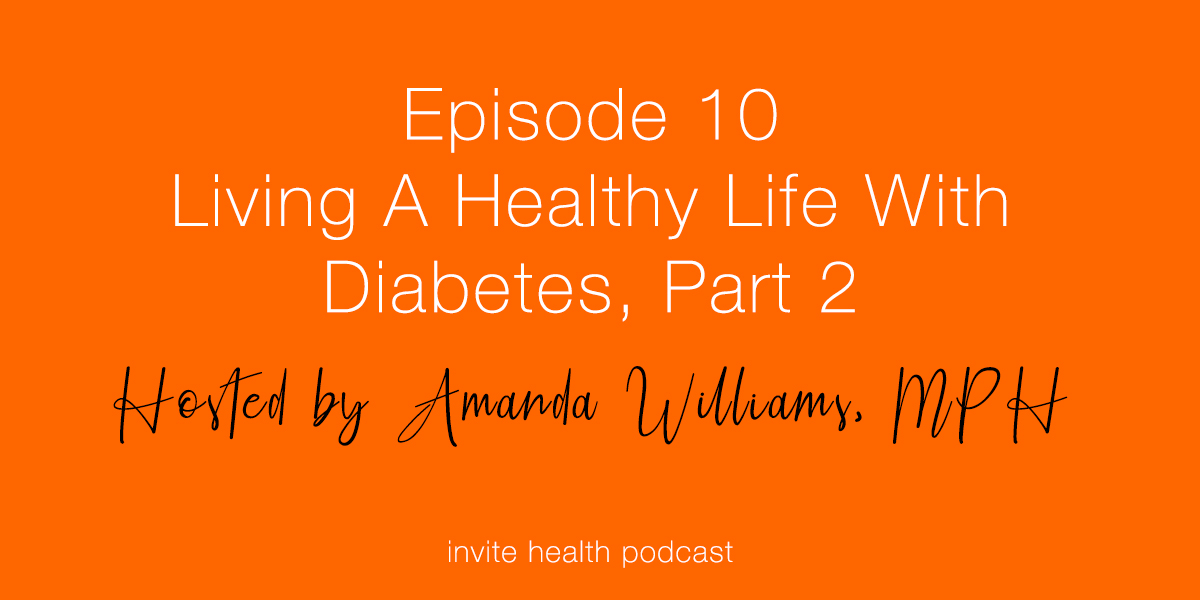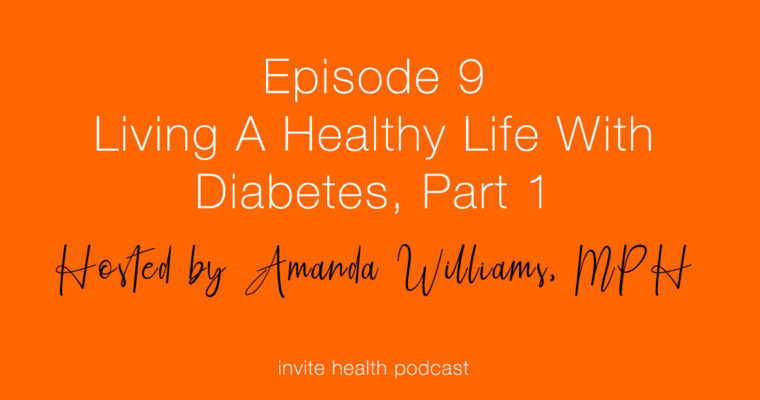Invite Health Podcast, Hosted by Amanda Williams, MPH
Subscribe Today!
In Episode 2 of Living A Healthy Life with Diabetes, I am going to break down the difference between being a prediabetic and having metabolic syndrome. The two generally go hand-in-hand, but it can oftentimes lead to confusion.
What does it mean to be prediabetic?
Prediabetes is when your insulin resistance is beginning to gain momentum. We’re talking about the pancreas, about beta cells that play such a critical role in releasing insulin in order to regulate elevations in blood glucose.
When someone has prediabetes, what they are seeing is those first stages of insulin resistance really starting to rev up. When it comes to testing, you are generally going to find things such as an elevated fasting glucose. This usually means that you’ve fasted for eight hours, ideally 10-12 hours.
Your doctor may also see elevations in hemoglobin A1C – the rate of glycation in the hemoglobin. This level is usually above a 5.7 and goes up to 6.4. Generally, doctors would like your level to be below a 5, but a realistic number is also 5.5 or 5.3. Once you get above the mid-level 5, that is when your doctor will be concerned.
Prediabetes, simply put, means your body is not doing as well to regulate your blood sugar.
For more information on Diabetes, be sure to check out Episode 9 and Part 1 of Amanda Williams Diabetes series by clicking here.
What is metabolic syndrome?
Metabolic syndrome is definable by a few different things. Not only is there a clear insulin resistance occurring, we are also dealing with visceral obesity or an increase in the waist circumference in the abdominal belly region. In conjunction, your cholesterol will also be impacted, specifically an elevation in triglycerides. You may also experience endothelial dysfunction – stiffing of the lining of your blood vessels – which leads to high blood pressure.
The World Health Organization first defined metabolic syndrome back in 1998. Metabolic syndrome does not make you a diabetic, but it’s borderline.
Essential Nutrients To Get Your Body (And Health) Back On Track
It is important to understand that you must be proactive and take steps to counteract both prediabetes and metabolic syndrome. Individuals who follow the Standard American Diet go way off track because you are not obtaining the proper nutrients that the body needs in order to manage or mitigate the negative implications of having elevated glucose and a delayed insulin response.
Fifty to seventy-five percent of Americans have a Magnesium deficiency. Research from the University of North Carolina sets that percentage closer to 75%, as only 12% of Americans are considered to be metabolically healthy. This is extremely sad and – no pun intended – is accredited to the Standard American Diet (SAD), which is incredibly low in magnesium. This has been shown to be directly correlated with Type 2 Diabetes, metabolic syndrome, high blood pressure, vascular disease and more.
Researchers from Tufts University Department of Endocrinology published a study in the journal Diabetes Care – which was highlighted by the American Diabetes Association – that drew a conclusion between Vitamin D supplementation and the impact it has on blood glucose and markers for inflammation in the body. Participants in the study with low levels of Vitamin D were given a Vitamin D supplement every day and found significant improvements in markers for inflammation, hemoglobin A1C levels, and fasting glucose.
Benfotiamine is a unique fat soluble B1 vitamin whose goal in your body is to activate an enzyme that helps to convert toxic glucose into harmless compounds so the body can easily get rid of it. One of the long term effects of being a prediabetic, having metabolic syndrome or actually having diabetes is Advanced Glycation End Products (AGEs). These are created when a sugar molecule attaches to something in the body like your blood vessels or nerves. This is damaging, as AGEs change the structure and function of so many different things in the human body – deactivating enzymes, disrupting cell signaling, destroying cellular DNA and creating inflammation and more. If we can incorporate Benfotiamine into our routine, it has been shown to block that sugar-induced damage. This is why it is such a powerful B vitamin.
Thank you for tuning in to the Invite Health Podcast. Stay tuned for Part 3 of Amanda’s Diabetes series, which will be released tomorrow – Friday, January 31.You can find all of our episodes for free wherever you listen to podcasts or by visiting www.invitehealth.com/podcast. Make sure you subscribe and leave us a review! Follow us on Facebook, Twitter and Instagram at Invite Health today. We’ll see you next time on another episode of the Invite Health Podcast.







